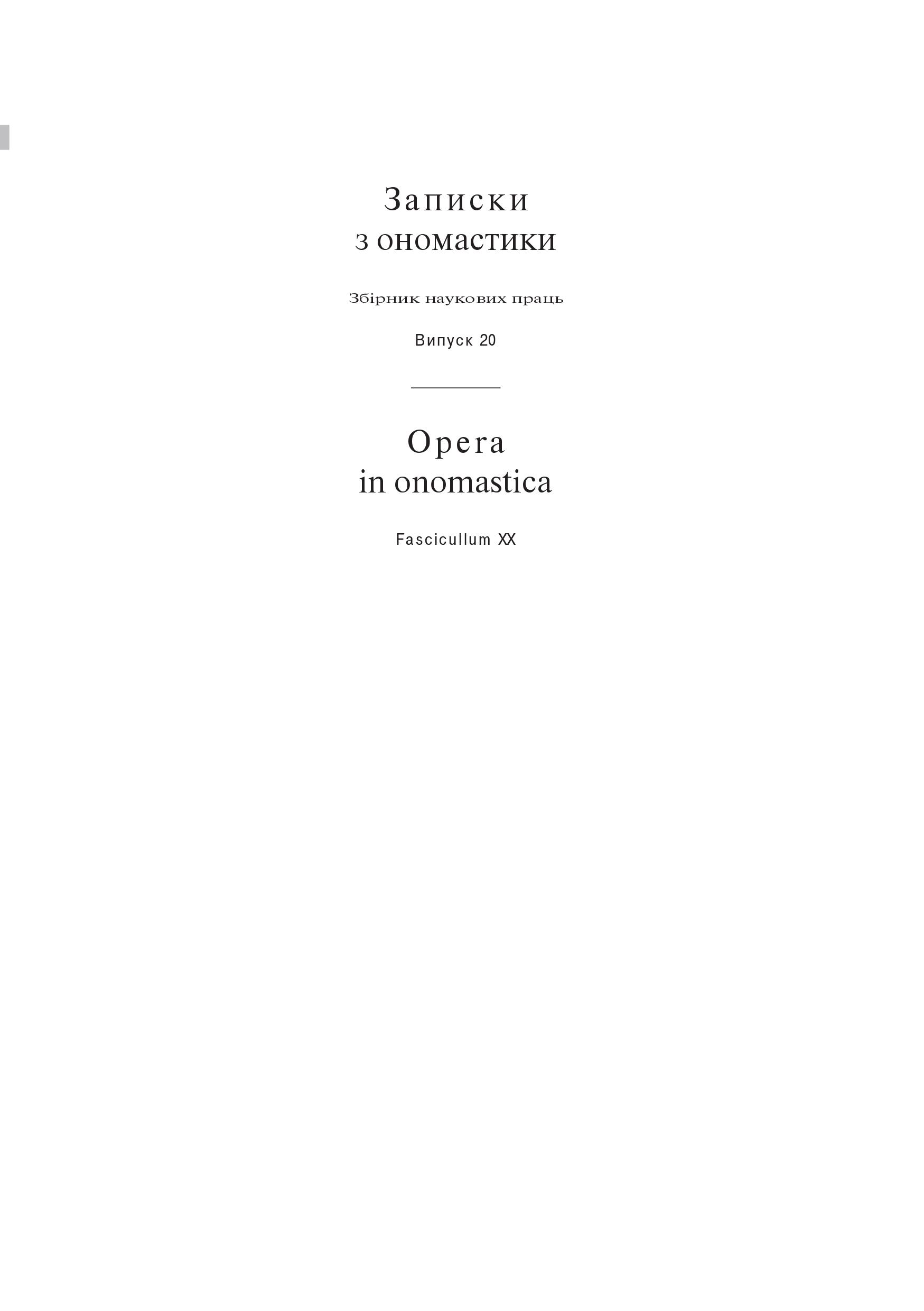КОНЦЕПТУАЛІЗАЦІЯ АНТРОПОНІМІЙНОГО СЕКТОРУ ПОЕТОНІМОСФЕРИ ЦИКЛУ РОМАНІВ С. МЕЙЕР «СУТІНКИ»
DOI:
https://doi.org/10.18524/2410-3373.2017.20.133852Ключові слова:
поетонімосфера, антропонімійний сектор, вільний асоціативний експеримент, асоціативний гештальтАнотація
У статті досліджується поетонімосфера циклу романів С. Мейер як організована та складна система взаємопов’язаних власних назв. Встановлено, що на трьох етапах функціонування літературно-художніх власних назв вони стають елементами трьох різних, але взаємопов’язаних систем: мовної картини світу, художньої картини світу та концептуальної картини світу. Охарактеризовано асоціативні поля поетонімів, які демонструють поширеність гетерономінативних асоціацій.Посилання
Arutyunova N. D. (1999) Language and the World of Man: Languages of Russian Culture, Moscow, 896 p.
Baevsky V. S. (1989) On Poetic Semantics of Akhmatova. Problems of Creativity and Biography of A. A. Akhmatova: conference abstracts, Odessa, pp. 12–13.
Buevskaya M. V. (2009) Poetonomosphere of the Poem by Oscar Wilde «The Sphinx»: Logos of Onomastics, Donetsk, South-East, Ltd., No. 1 (3), pp. 64–69.
Bydina I. V. (2005) The Concept «Creativity» in the Idiostyle of Victor Sosnori. Cultural Aspects in Language and Text: collection of scientific papers: Belgorod, pp. 86–93.
Herman I. A. (2000) Lingvosynergetics: monograph, Barnaul, 168 p.
Didur Yu.I. (2015) The Special Functions of the Ergonims in Language, Speech and Mental Lexicon (in the Ukrainian, English and Russian languages): Thesis, Odessa, 195 p.
Dolbina K. D. (2014) Cognitive Aspects of the Functioning of Units of the Zone’s Property: Thesis, Odessa, 181 p.
Dombrovan T. I. (2014) Synergetic Model of the Development of the English Language: monograph, Odessa, 400 p.
Dombrovan T. I. (2015) Heuristic Potential of the Categories of Linguistic Synergetics for Onomasiological Studies: Notes on Onomastics, Odessa, pp. 213–220.
Dombrovan T. I. (2013) Language in the Context of Synergetics: monograph, Odesa, 346 p.
Dubenko O. Yu. (2013) Artistic Picture of World: the Main Directions of Research: Language and culture: Issue 16, Vol. 4., pp. 10–14. [Electronic resource] Access mode: irbis nbuv.gov.ua/.../cgiirbis_64.exe?
Kalinkin V. M. (1999) Poetry of Onim: monograph, Donetsk, 408 p.
Karpenko O. Yu. (2010) Cognitive Onomastics: teaching guide, Odessa, 158 p.
Karpenko O. Yu. (2007) Cognitive Onomastics as a Direction of Knowledge of Proper Names: Thesis, Kiev, 416 p.
Karpenko O. Yu. (2006) The Problem of Cognitive Onomastics: monograph, Odessa, 325 p.
Karpenko Yu. A. (1991) Functions of Proper Names in the Work of Yu. Olesha «No Day Without a String»: Language and Style of Works by I. E. Babel, Yu. K. Olesha, I. A. Ilf and E. P. Petrov: collection of scientific papers, Kiev, pp. 83–95.
Klymkova L. A. (1991) The Associative Meaning of Words in Fiction: Philological sciences, Vol. № 1, pp. 45–54.
Lakoff J. (1981) Linguistic Gestalt: New in Foreign Linguistics, Moscow, Issue 10, pp. 350–368.
Leontiev A. A. (1977) General Information on Associations and Associative Norms: dictionary of associative norms of the Russian language, Moscow, Publishing House of Moscow State University, pp. 5–16.
Markovina I. Yu. (2000) Specificity of the Language Consciousness of Russians and Americans: the Experience of Constructing an «Associative Gestalt» of the texts of the Original and Translation: collection of articles, Moscow, pp. 116–132.
Morozova I. B. (2009) Paradigmatic Analysis of the Structure and Semantics of Elementary Communicative Units in the Light of Gestalt Theory in Contemporary English: monograph, Odessa, 384 p.
Misik S. G. (1989) The Lyrics of Anna Akhmatova and the Poetics of «Possible Worlds». Problems of Creativity and Biography of A. A. Akhmatova: abstracts of reports of the region. scientific conf., Odessa, pp. 13–15.
Neklesova V. Yu. (2010) The Cognitive Nature of the Proper Names on the Designation of Time: thesis, Odessa, 230 p.
Oguy O. D. (2013) Linguistic Picture of World: the Problem of Organization of Components: Kiev, Issue 4., pp. 15–26.
Petrova L. O. (2008) The Artistic Picture of the World in the Russian Satirical-Humorous Narrative of the Beginning of the Twentieth Century: thesis, Kiev., 418 p.
Pozdnyakov D. A. (2013) English Verbalization of the Concept of Insanity (based on dictionaries and artistic texts): thesis, Odessa, 20 p.
Popova Z. D. (2007) Cognitive Linguistics: monograph, Moscow, 314 p.
Popova Z. D. (2003) Essays on Cognitive Linguistics: monograph, Voronezh, 191 p.
Selivanova O. O. (2010) Linguistic: Poltava, Kiev, 843 p.
Sergieva N. S. (2006) Semantic Gestalt and the Core of Russian Language Consciousness:Issue 2 (57), pp. 160–165. [Electronic resource] Mode of access: http://cyberleninka.ru/article/n/semanticheskiy-geshtalt-i-yadro-yazykovogo-soznaniya-russkih.
Tkachenko G. V. (2012) English-language Graphemes as Linguistic and Cognitive Phenomena of the World Picture: thesis, Odessa, 236 p.
Fesenko T. A. (2005) Mental Lexicon: Problems, Structures and Representations: Questions of Cognitive Linguistics, No. 3, pp.53–58.
Tsarenko E. I. (2014) Some Methods of Interpretation of Artistic Texts M. A. Bulgakov: East Ukrainian Linguistic Collection, Issue 15, Kiev, pp.152–281.
Yaremko Ya. P. (2015) Conceptual Concepts of Modern Political Science: Linguistic and Cognitive Aspect: Thesis, Odessa, 36 p.
Deese G. (1965) The Structure of Associations in Language and Thought: Baltimore, The John Hopkins press, 216 p.
Evans V. A (2007) Glossary of Cognitive Linguistics: Edinburgh, 239 p.
Geeraerts D. (2006) Methodology in Cognitive Linguistics. Cognitive Linguistics: Current Applications and Future Perspectives: Walter de Gruyter, pp. 21–50.
Lakoff G. (1987) Women, Fire, and Dangerous Things: What Categories Reveal about the Mind: Chicago, University of Chicago Press, 57 p.
Potapenko S. I. (2013) Introducing Cognitive Linguistics: manual for students, Nizhyn, 136 p.
Talmy L. (2005) Foreword. Methods in Cognitive Linguistics: Amsterdam, JohnBenjamin Publishing Company, pp. 1–12.
##submission.downloads##
Опубліковано
Як цитувати
Номер
Розділ
Ліцензія
Авторське право (c) 2020 Записки з ономастики

Ця робота ліцензується відповідно до Creative Commons Attribution-NonCommercial 4.0 International License.
Правовласниками опублікованого матеріалу являються авторський колектив та засновник журналу на умовах, що визначаються видавничою угодою, що укладається між редакційною колегією та авторами публікацій.

